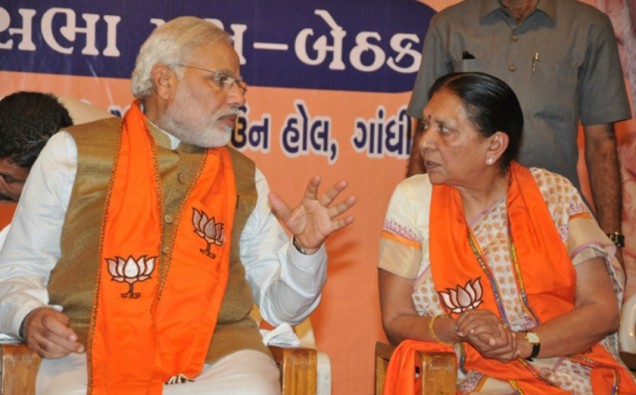
A file photo Narendra Modi with Anandiben at a meeting in May 2014/Wikipedia
Human Rights Watch. has called out leaders of India’s ruling Bharatiya Janata Party for publicly backing Hindu supremacy over other religions, which has resulted in attacks against Muslims and other minorities.
The Rights group lambasted the BJP government for its failure to prevent or probe attacks against religious minorities.
“The government failed to promptly or credibly investigate the attacks, while many senior BJP leaders publicly promoted Hindu supremacy and ultra-nationalism, which encouraged further violence,” the New York-based body said.
In its report on human rights in 2017, the HRW notes that “extremist Hindu groups, many claiming to be affiliated with the ruling BJP, committed numerous assaults against Muslims and other minority communities in response to rumors that minority group members sold, bought, or killed cows for beef.”
Secular political parties and liberal intellectuals in India have been criticizing the ruling BJP’s affiliation and approval of extremist policies of violent groups that target minorities and spread hate against them.
Analysts say since 2014, when Narendra Modi came to power, the BJP’s discriminatory ideology and frequent attacks against Muslims and minorities have deeply hurt the secular character of the country, long a matter of pride for the country’s culturally and religiously diverse population.
The report notes that “instead of taking prompt legal action against the attackers, police frequently filed complaints against the victims under laws banning cow slaughter.”
According to the report there were at least 38 attacks against Muslims and other minority communities over the trade or slaughter of cows for beef in 2017. At least 10 people were killed.
Instead of punishing attackers, police officials often filed complaints against the victims under laws banning cow slaughter, the rights group said. Since the BJP came to power, mob violence and incidents of lynching against Muslims and Dalits have escalated.
“Indian authorities have proven themselves unwilling to protect minority religious communities and other vulnerable groups from frequent attack,” Meenakshi Ganguly, HRW’s South Asia director, in a statement.
“There needs to be a serious effort to prevent future attacks and to prosecute all those responsible for the violence,” she said.
In the 643-page World Report, its 28th edition, Human Rights Watch reviews human rights practices in more than 90 countries, and comes in the wake of divisive politics led by Prime Minister Narendra Modi, whose adherence to the Hindutva policy is widely blamed for rise of the militant groups like RSS and Bajrangdhal
In his introductory essay, Executive Director Kenneth Roth writes that political leaders willing to stand up for human rights principles showed that it is possible to limit authoritarian populist agendas. When combined with mobilized publics and effective multilateral actors, he wrote these leaders demonstrated that the rise of anti-rights governments is not inevitable.
In August, India’s Supreme Court declared the right to individual privacy “intrinsic” and fundamental under the country’s constitution, and emphasized the constitution’s protections, including free speech, rule of law, and “guarantees against authoritarian behavior.”
However, HRW notes, the Indian authorities harassed and brought charges, including for sedition and criminal defamation, against activists, academics, journalists, and others critical of government actions or policies. Threats of legal action and arbitrary corruption investigations put increasing pressure on journalists and media outlets to self-censor.
State governments resorted to blanket internet shutdowns in misguided attempts to prevent violence or social unrest, or to maintain law and order, the report said. By November, they had imposed 60 internet shutdowns, 27 of these in Jammu and Kashmir state.
The government also used the Foreign Contribution Regulation Act (FCRA), which governs access to foreign funding for nongovernmental organizations, to cut off funds and harass activists and human rights defenders, it said.
Nearly five years after the government amended laws against sexual violence, girls and women still faced barriers to reporting such crimes, including humiliation at police stations and hospitals; lack of protection; and degrading “two-finger tests” by medical professionals to make characterizations about whether the victim was “habituated to sex,” according to HRW.
As in previous years, India passed up chances to demonstrate leadership on human rights issues at international forums such as the United Nations Human Rights Council and General Assembly, it added.
















